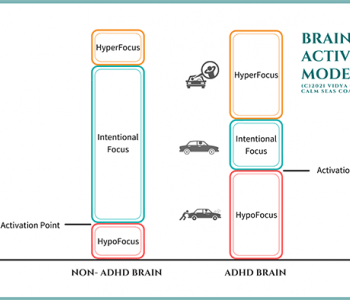The Many Faces of ADHD: Women*
ADHD Education
ADHD is ADHD, and men and women can have it with the same symptoms. But researchers have also noticed that some women experience ADHD (attention-deficit/hyperactivity disorder) in ways that make theirs a unique experience, and that may be related to their gender. We still don’t have all the answers as to why this is so. Every woman is different. But there are some difficulties that many women with ADHD share, and researchers have begun to study the issue more in depth.
How do women experience ADHD?
It's not uncommon for females with ADHD to be diagnosed as adults. Many girls with the disorder tend to not get noticed as kids. This is because they are more likely to be the quiet, daydreaming type – not the hyperactive type that runs around the classroom and quickly gets noticed by teachers. They don’t get into trouble like many hyperactive boys do. They might seem shy, and when they have trouble paying attention or making friends, they might get written off as depressed or just lazy. Often, they suffer in silence.
Some women only find out that they have ADHD after one of their own children has been diagnosed. As they go about helping their child, these woman begin to notice similar patterns in themselves.
What does ADHD look like for women?
Many women seek treatment because their lives are out of control. They can't keep track of money, they lose important documents, or they have trouble keeping records in order. They can't keep up with things at work. Even tasks like cooking and laundry can be hard to manage. Some women are better at "hiding" these struggles than others. But either way, they often feel exhausted and overwhelmed.
How are women with ADHD different from men with ADHD?
In many women, the disorder is the same as in men. In addition to having ADHD, they are just as likely to feel depressed and/or anxious. But women with ADHD often have the following additional problems to a greater degree than men with ADHD:
- They are constantly irritable and "down."
- They overeat.
- They use alcohol to "self medicate."
- They have problems with sleep.
- Their feelings of low self-esteem are often stronger than in men with the disorder.
- The burden of ADHD puts women at higher risk for diseases related to stress like fibromyalgia.
What treatments work best for women with ADHD?
Given the difficulties many women face, experts say it's a good idea to use several strategies or interventions at the same time. An effective treatment plan might include medication, therapy, stress management, as well as ADHD coaching and/or professional organizing.
- Medications: Medications can be very helpful for women with ADHD. Make sure you are treated by a doctor who has experience with the disorder, because a woman's hormonal fluctuations and life stages like menopause can affect how ADHD medications react in the body. When estrogen levels fall, ADHD symptoms can worsen. In some cases, hormone replacement may need to be integrated into the medication regimen used to treat ADHD.
- Psychotherapy: While some types of therapy (e.g. psychoanalysis) are not shown to be effective for ADHD, others (e.g. cognitive and behavioral therapies) can be helpful in managing the impact of ADHD symptoms on daily life. Approaches that help you analyze how you think and how you act can also help you to better understand the obstacles and how to overcome them. These therapies can improve how women with ADHD feel about themselves.
- Parent training: ADHD can make it hard to juggle all the responsibilities of taking care of children. If you have ADHD, there is a higher chance that a child of yours will also have it; this can make parenting extra difficult. You might benefit from taking a parent training course both for yourself and your child. Studies show that it can help in both ways.
- Group therapy/joining a support group. Many women with ADHD benefit from talking with others who also have the disorder. Support groups or groups run by licensed clinicians can serve as "safe" places where you feel understood and accepted.
- ADHD coaching. There are life coaches who have a specialty in working with people with ADHD. They can meet with you in person or work by e-mail or over the phone. A coach can help you to set up ways to manage their daily chores, keep track of things to do and even help to manage long term projects that you are having difficulty getting started. Studies show that coaching can be helpful in giving adults with ADHD the life management tools they need to work around the disorder. ADHD coaching is a relatively new profession so you should check references carefully.
How can I help myself?
If you are a woman with ADHD, you should know that it is a very treatable condition. As overwhelmed as you may feel, know that you can feel better. There is a lot you can do to regain control of your life, instead of having ADHD control you. Here are some important principles to keep in mind:
- You have a brain-based disorder. Don't blame yourself – ADHD is NOT your fault.
- Try to think about what stresses you out. Is it household work, getting kids ready for school, or work? Once you know where you biggest challenges lie, you can focus on improving those areas.
- Keep it simple. It's easier said than done, but try to avoid situations that you know can cause stress.
- Get help from family and friends.
- Schedule daily "me" time.
- Try to eat and sleep on regular schedules.
- Focus on the people and things you love.
Every woman with ADHD has different needs and challenges. There is no one-size-fits-all way to handle the disorder. Ultimately, the right treatment plan is the plan that works for you.
Sponsored by:
- ACO
- ADDA
- ADDitude
- CHADD
- National Resource Center on AD|HD
* Adapted from What We Know # 19: Women and ADHD, National Resource Center on ADHD: A Program of CHADD (NRC). The NRC is supported through Cooperative Agreement Number 5U38DD000335 from the Centers for Disease Control and Prevention (CDC). The contents are solely the responsibility of the authors and do not necessarily represent the official views of CDC.












